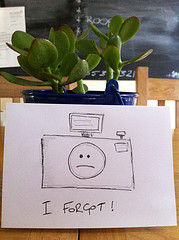I had something completely different in mind with which to end the week here, but then I sat down tonight to watch the latest episode of House over dinner. There’s nothing like a really good story that makes you want to discuss things, and this episode was loaded with questions.
A few weeks ago, I posted my review of House and Philosophy: Everybody Lies. If you’re a regular reader, you already know that I’ve been enamored by this program since Karen introduced me to it two (or is it three?) seasons ago. House’s character is absolutely fascinating, and he’s certainly leaving the viewer much to think about in this episode.
What I loved about this episode, though, isn’t so much the character development, but the overarching question that it leaves the viewer asking. The patient in this episode is initially introduced with, among other things, a rare ability to recall every memory since puberty. Every minute of every day. House asks her how many times she tripped and fell during a given year, and she was able to answer. A quirky and unique attribute to carry around with you, at least in a too-weird-to-be-true, James-Bond-villain sort of way. When the patient encounters her estranged sister, though, we discover that there is a curse that goes with this ability. The patient is unable to forget anything that her sister ever did to her that was wrong. As such, she finds herself unable to forgive. By the end of the episode, we discover that this total recall is actually not a gift but rather a symptom of a different condition. The result is still the same, though: she cannot forgive because she cannot forget.
I’m left asking myself the question: is forgetting actually a gift? Do we actually want to remember everything that happened, exactly as it happened? The character in this episode talks about how we all selectively edit our memories, almost as a coping skill, to dwell on the positive in a situation instead of the negative. Do you think that’s a natural skill that’s hard-wired into us so that we don’t completely forsake everyone who’s ever wronged us?
Think of it this way: when a person is exposed to a trauma, it is not at all uncommon for the person to dissociate. In doing so (at least if you follow the commonly accepted theory), the brain actually blocks out an event or memories of the event. The condition can become extremely serious, theoretically resulting in the formation of multiple personalities in extreme cases.
The patient in this episode finds herself in the undesirable position of judge. Because she can’t forget anything that’s happened, she must weigh the good against the bad in every person, and cut that person off if the bad outweighs the good. There’s obviously a theology at work there, and not, I suspect, by accident (House frequently explores themes of spirituality). Were we to find ourselves without the ability to forget anything wrong that anyone has ever done, would we then find ourselves forced to set up our own sort of soteriology based on relative merit and human performance? If so, would we hate it? Would we find ourselves, as this character does, ostracized from every significant relationship, because we have been unwillingly forced to have a knowledge of good and evil? Finding ourselves in that position, would we be able to be at all benevolent?
This episode is fascinating because it questions whether or not forgiveness is possible if one cannot forget. This strikes to the core of what true forgiveness really is: casting the offense or hurt behind us and treating it as though it had never happened, intentionally purging it from our memories. That is even a Divine practice in the Christian scriptures. Think of it as a healthy dissociation.
Can we forgive if we cannot forget? Is the ability to forget a gift? Would we want to remember events in all of their details, or is it better to remember the essence of an event? Does our culture permit forgetting, and by potentially not doing so, encourage an absence of forgiveness? Those are some heavy questions. What do you think?
Photo Attribution: Remy Sharp
